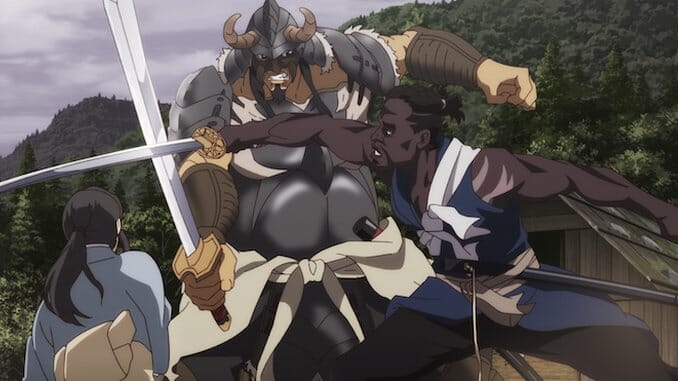Yasuke: Despite a Desire to Go Big, Netflix’s New Anime Shines in Quieter Moments
Photo Courtesy of Netflix
There are many holes in history, and several of them effectively scrub minorities from the stories we tell about our countries. For every Francis Drake there’s a Zheng Yi Sao, and for every Billy the Kid there’s a Nat Love. It’s tragic just how many of these potential heroes have been lost to time, with no scribes recording the Herculean efforts of their achievements.
These unsung heroes were exactly who LeSean Thomas was interested in when he set out to make Yasuke. With the aid of MAPPA, maybe the hottest animation studio of the modern era, Netflix’s six-episode Yasuke follows the elusive Black samurai of the same name who famously served as retainer to Oda Nobunaga, the Great Unifier of Japan and one of history’s most notable warlords. The story isn’t quite interested in Yasuke’s time with Nobunaga, though—the series takes place some 20 years after Nobunaga’s assassination.
Yasuke (voiced impeccably by LaKeith Stanfield) is now older and works as a boatman under a pseudonym in a cozy countryside village. After meeting a beautiful koto player named Ichika (Gwendoline Yeo), he is tasked with helping her and her sick, psychokinetic daughter Saki reach a doctor up-river. The hero then becomes embroiled in a conspiracy to capture Saki, who is coveted for her extreme (but uncontrollable) abilities.
Yasuke, as a Black man in Japan, isn’t respected or regarded in the same light as others of similar or even inferior talent; it’s one reason LeSean Thomas decided to fill in the gaps of Yasuke’s scant known history with mechas and magic. But these elements are occasionally an extraneous and even confusing distraction for the show’s themes that are otherwise quite strong. For example, Yasuke—who is preternaturally talented with a blade—is shown to be regarded as little more than a servant and not a samurai in his own right by Nobunaga’s former general Akechi Mitsuhide, the man who would later betray Nobunaga. Yasuke deals not only with racism but conservatism, tradition, and nationalism as a whole.
In the alternate Japan the show takes place in, these are rancid ideals, ones that quite literally twist and contort people into demonic beings consumed by their own greed and hatred. Yasuke’s devaluing parallels Natsumaru’s (Ming-Na Wen), a fellow retainer who is seen as lesser because she is a female warrior. The two share a strong bond as members of Nobunaga’s inner circle who aren’t allotted the respect they deserve. Though one of Japan’s bloodiest warlords, Nobunaga was also well-known for his progressive ideas; his civil policies were concerned with connecting people through central roads, abolishing monopolies, and even allowing for the construction of the first Christian church in Kyoto.
This kind of passion extends to Yasuke, who views life and death as equally precious. The show shines in its quieter moments, when Yasuke walks through serene villages contending with his trauma, all the while ensuring Saki doesn’t face the same bloodshed he has. These scenes are galvanized by Flying Lotus’s excellent score, which is surprisingly restrained throughout—sporadic trap beats pulse through organic sounds of shamisen and taiko, providing an effortlessly cool vibe that perfectly suits Yasuke’s unpretentious composure. FlyLo has said that he composed the music “chronologically” alongside the character’s growth, effectively avoiding static cliches and remaining dynamic throughout.